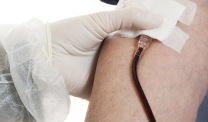Early Mesothelioma Vaccine Testing Shows Promise
Research & Clinical TrialsWritten by Sean Marchese, MS, RN | Edited By Amy Edel

Sellas Life Sciences reports its Phase I clinical trial showed improvement of overall survival in patients with pleural mesothelioma. The study focused on a new potential therapy called GPS (galinpepimut-S), an immunotherapy vaccine.
The trial included 10 patients with relapsed or refractory mesothelioma, nine of whom received at least three doses of GPS. Researchers gave the third dose of GPS alongside the checkpoint inhibitor Opdivo (nivolumab).
President of Sellas, Angelos Stergiou, stated in a press release, “As we had hypothesized in the past, this increase in survival appears to be consistent with long-term immunity-mediated antitumor effect with our immunotherapy combination as we had seen in other studies with GPS.”
“Importantly, the positive survival outcomes seen in this study are accompanied by a safety profile similar to that of the checkpoint inhibitor alone,” said Stergiou. “We believe that these observed survival benefits … contribute to stopping the progression of extremely aggressive cancers and demonstrate its utility as a potentially effective combination therapy.“
GPS and Opdivo Combination More Than Triples Survival
All patients enrolled in the trial achieved a median progression-free survival of 11.9 weeks or about three months without any increase in cancer growth. A third of patients had stable disease with a tumor decrease of 17%.
The median age of patients in the study was 69 years, and 60% enrolled with a Stage III or Stage IV mesothelioma diagnosis. Study participants had previously received pemetrexed-based chemotherapy and either progressed after treatment or were not responsive to the medication.
The study defined an immune response to GPS as a measurable increase in multiple types of immune cells. About 78% of patients in the study had an immune response, and these patients had a median overall survival of nearly two years and four months, or 19 months longer than those without an immune response.
The median overall survival for patients who didn’t have an immune response to GPS was nine months. The median overall survival for patients with an immune response to GPS was 27.8 months, more than three times longer.
For the nine patients who received the combination of GPS and Opdivo, the median overall survival was 70.3 weeks or almost 18 months. Patients with relapsed or refractory mesothelioma who receive standard therapy have an overall survival of about 28 weeks.
Previous Study Results Point to Continued Success
In June 2023, Sellas first reported positive Phase I results from GPS after a prior trial, improving survival in mesothelioma patients. The study improved median overall survival in patients with Stage IV disease two months.
“We have seen in two studies where GPS appears to increase the survival benefit in active disease when combined with checkpoint blockade drugs, one with relapsed/refractory WT1 positive ovarian cancer and now in relapsed/refractory WT1 positive mesothelioma,” said Sterguiou.
All patients during the Phase I study experienced some level of adverse events. Seven patients reported treatment-related toxicities. In three cases, patients required hospitalization. Three patients reported mild GPS-related toxicity.






